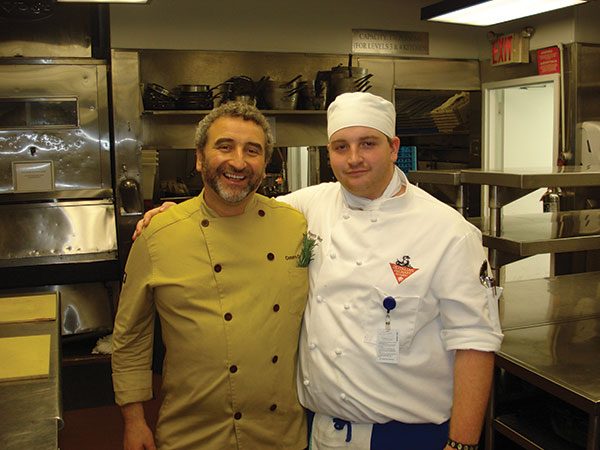
Kenneth West III, 19, of Clifton keeps a little black book. But it’s not what you might think. It holds some 60 recipes that the recent Italian Culinary Academy (ICA) grad collected or concocted while working as a stagista—a culinary intern—at the five-star Bauer Hotel’s Restaurant De Pisis on the Grand Canal in Venice. Among the treasures: the De Pisis’s signature turbot stuffed with cream of chestnut; West’s own cuttlefish ravioli in squid-ink sauce; and his personal favorite, testa di maiale croccante—crispy pork over sautéed spinach, a Sardinian specialty.
West’s apprenticeship was part of a 29-week course run by ICA, which is based in Manhattan. The program consists of ten weeks in ICA’s Manhattan kitchen and classrooms, nine weeks at Alma, the international school of Italian cuisine, nine weeks apprenticing in a restaurant in Italy, and a week back at Alma for finals and graduation. Alma is located on the grounds of a palace once belonging to the Hapsburg Maria Luigia, Napoleon Bonaparte’s second wife, in Colorno, about six miles from Parma, the hub of all foods authentically Parmesan—where the locals have never heard of a chicken parm sandwich.
“If you’re trying to learn Italian cuisine, the only way to learn it is in Italy,” says West. “In America when you think of Italian cuisine, it’s very different—garlic, red sauces, lots of cream sauces. But it’s [actually] a lot of fish, fresh vegetables, and local products.”
“Italy for centuries was divided into small independent states,” explains chef Guido Magnaguagno, coordinator of ICA. “That is why most regional cuisines are so different from each other. North being richer, with the Spanish and French dominations, has flavor similar to those cuisines. South, being drier and poorer, dominated by the Arabs, has a zestier, sweet-and-sour tendency. The ingredients being fresh is a great thing, but the local contribution of the people to their food is what sets Italian food apart.”
Each year ICA sends about 80 students to study at Alma “to learn respect” for the ingredients, says Cesare Casella, a Tuscan chef and ICA’s dean. Of students enrolled in ICA this year, about 20 percent are from New Jersey. Instructors at Alma are chosen by the school’s rector, Gualtiero Marchesi, the first Italian chef to earn three Michelin stars and the father of modern Italian cuisine.
“Modern Italian food is food cooked properly that is made with seasonal Mediterranean ingredients, tastes good, and, at the end of the day, doesn’t leave you feeling like you have a rock in your stomach,” says West. Pasta with sautéed zucchini and carrots and Marchesi’s bronzino with fennel are two examples.
At De Pisis, West’s duties included preparing two meals a day for the restaurant staff, assisting in pastry making, cooking side dishes for the saucier, Arturo Granato, and the inevitable grunt work that comes with being the new kid. “[Granato] cooked and made a mess, and I cleaned up after him, but he was a good friend,” says West.
While in Italy, West learned to fillet a whole tuna, extract chlorophyll from parsley to tint pasta dough, and perfectly dice carrots, onion, and celery so they lend their fullest flavor to vegetable stock. Side trips to observe prosciutto being cured in Emilia-Romagna, olives harvested in Tuscany, and white truffles hunted in Alba, and “a lot of wine made all over,” underscored the fact that in Italy “the food is an integral part of the culture,” says West. “It is life, just as important as breathing.”
Yet he recalls that his favorite professor advised students returning to their homelands, “Don’t order everything from Italy. Use your local ingredients.” So West is temporarily turning his attention away from his little black book and toward his backyard, where he plans to plant a vegetable garden.
Even though he finished second in his class, with a 95 grade-point average, West found job offers scarce in this difficult economy. In June, he caught on as a line cook at a new Latin bistro in Ridgewood. He says he plans to start a personal chef and catering business called Micro Gourmet.
